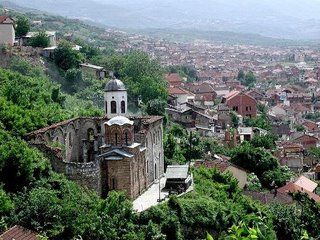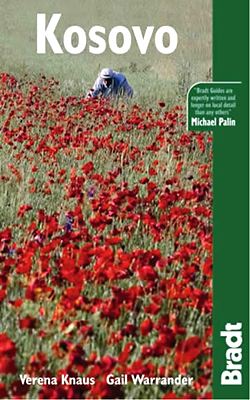As the talk of an imminent declaration of independence by Kosovo next Sunday or Monday intensifies, and as leaders in Serbia and Russia make statements rejecting it in advance, bloggers in the Balkans have been busy discussing the issue since December. Here are a few of their views.
Shannon, an American working for the UN in Pristina, on Feb. 10 described what is expected to happen next regarding Kosovo's independence:
It seems that the clock is ticking on Kosovo's independence. It is expected that Kosovo's parliament will sign a declaration of intent to declare independence on 17 February. The actual declaration is due to take place in early March. The timing of the decision is interesting as it looks to be set to take place right before the meeting of the EU and on Sunday which would give more than 100 countries a chance to recognize Kosovo's independence before the UN in NY woke up and Russia could call an emergency session of the Security Council to block the move. There are fears that jovial mobs of Albanians celebrating may attack fleeing, angry, and scared Serb communities who are expected to make a mass exodus from Kosovo following independence despite Kosovo PM's assurances and pretty speeches about how Kosovo Serbs should stay.
And, in her last post on Feb. 14, she added:
Lately the news makes my head spin in regards to Kosovo's independence declaration. There are so many conflicting reports about what will actually take place this Sunday. Will it be an intent to declare or an actual declaration…at this point, I really can't tell and anyone who reads the news as I do is probably just as confused about what is going on. The UN has issued a warning to staff to be vigilant and to not take part in any celebrations in their official capacity and Serbia's PM has asked Kosovo Serbs to stay put and reaffirmed that Belgrade will never recognize the declaration. Meanwhile, some Serbs in the north are ready for a fight should Kosovo try to rein in north of the Ibar river.
At the end of January, as Slovenia was entering its second month of EU presidency, a memo of consultations between the U.S. State Department and Slovenia's Ministry of Foreign Affairs was leaked to the media. In the memo, Americans outlined their foreign policy priorities (including support for Kosovo's independence). This sparked a heated debate in Slovenia. Slovenian blogger Sleeping with Pengovsky has recently expressed his opinion on what his country's position should be:
As odd as it may seem, Slovenia and Kosovo share a common link in recent history (apart for the fact that they’ve both been a part of Yugoslavia).
[…] Milošević started the breakup of Yugoslavia in Kosovo and it is only right and fitting that the process come full circle and ends where it started twenty-one years ago. Slovenia declared independence only four years after that fateful phrase and the memory of every political power in the world (including the EU and the US) trying to block our way to independence one way or another is still very much alive.
Not so much out of solidarity or heeding to a US dictate, but out of the fact that Kosovo has similar legal grounds for independence and that Serbia lost it by waging war against its people (just as it did in Slovenia), I think that Slovenia must recognize Kosovo as soon as it declares independence. I think it is only fair that Slovenia uses the same arguments when deciding on this as it did when arguing its own case for independence seventeen years ago.
Dr. Filomena, another Slovenian blogger, disagrees with that view. For her, Slovenia shouldn't be the first to recognize Kosovo's independence, “if for no other reason, then for the sake of our investments in Serbia.” She also discusses whether Serbia should be entitled to have a say in the matter and be compensated for Kosovo's loss:
I hope that whether or not Serbia is entitled to a say in the issue of Kosovo’s independence in the eyes of the EU or the US that keeps one of its largest military bases in the world in Kosovo, a region that is positioned strategically and holds an enviable reserves of lignite, which are estimated at around 12 billion tonnes (source), other natural resources and fertile land with cheap labour to boot, I do hope that they offer Serbia what its people will consider fair compensation for lost territories and resources. Considering what’s at stake, it shouldn’t be so hard to offer the country something more tangible than the EU freer trade, visa liberalisation and educational exchanges […]
Although for most external observers and international media the independence of Kosovo is inevitable, for Serbian bloggers that outcome is still debatable and a painful issue, as expressed by Serbian-Croatian blogger Boris Matijas [es] in a little metaphor of EU negotiations with Serbia on the Kosovo issue:
-Can I cut your arm?
-No
-Can I cut your arm? Please
-No!
-Come on, let me cut your arm, please.
-No, stop being a pain!
-Ok, fine. No need to get so worked up.
Some years later…
-Let me cut your arm.
-No!
-Ok. Listen. This is my last offer: let me cut your arm and I'll let you be my friend.
Aleksandar Vuksanović at Semanario Serbio, a collective Serbian blog in Spanish, recently wrote a post giving his reasons against Kosovo's independence:
The independence of Kosovo is the maximalist solution that satisfies the demands of the Albanians, completely ignoring those of the Serbs or other ethnic groups in Kosovo. In theory, there's a broad range of possible solutions for Kosovo that could satisfy both sides because we can find similar situations in the world. I'm referring to some solutions like Hong Kong (one country – two systems), South Tirol, Faroe Islands or some type of autonomy such as Mount Athos in Greece. We have to grant to the Albanians all the instruments for them not to feel threatened but this shouldn't allow them, as it has been the case until now, to threaten and harass other ethnic groups in the province.
[…] The independence of Kosovo would be a prize to the terrorism that the Albanians in Kosovo used to reach the current situation. It is difficult to imagine other European groups in a similar situation not resorting (or accentuating) the use of the same terrorist methods to achieve their separatist dream.
Basque professor Asier Blas from Cartas del este, another blog in Spanish focusing on Eastern Europe, doesn't agree with the argument often used by Serbian politicians to oppose Kosovo's independence on the ground of protecting the Serbian minority in the province, because for him the leaders in Belgrade are not really interested in protecting the interests of that minority:
[…] for Belgrade, the future of the Serbian minority in the province is a secondary issue, and it is only partly interested in it because it serves as a pretext to oppose the pro-independence project.
[…] Politicians in Belgrade are not feeling empathy for the situation that the Serbs in Kosovo are living, they are only concerned about their patriotic pride wounded by the upcoming amputation of a part of their current territory […]
If Serbia were acting at the service of Serbian Kosovars, it should commit itself to a multicultural state in Kosovo. In this way, the rights of the minorities would be more protected and guaranteed, and also all those symbols of the Serbian nation that are now attacked. In that sense, Serbs have given priority to keeping Kosovo within their national boundaries and have never considered seriously negotiating a project for an independent Kosovo that would guarantee an optimal and safe situation for Serbian Kosovars.
Francisco Veiga [es] believes that regardless of whether Kosovo declares its independence next Sunday or not, the issue will sure spark passionate reactions all over Europe “with he same football frenzy shown previously towards conflicts in the Turkey-Balkan region”. For him, discussing Kosovo's separation from Serbia is discussing much more than just that:
It is a characteristic of discussions on these cases to be associated with issues that are totally unconnected to the apparently central one. As a result, real matters that are simply in the waiting list for the immediate future remain in the shade: the impressive rapprochement between Ankara and Athens, the possible debate about EU integration of the republics in the Caucasus, the threat that Kosovo's independence represents for the integrity of Macedonia or the possible chain outbreak of double standards.
We can find an example of the implications of Kosovo's independence for other frozen conflicts in Georgia, as described in Steady State‘s post What is Kosovo for Georgia?:
It is interesting that Kosovo was poised to get independence since 1999, but, until recent couple of years, Russia hasn’t been drawing parallels with Abkhazia or South Ossetia. Could it be due to Saakashvili’s efforts to join the NATO and his usually bitter rhetoric towards Russia that prompted Putin to argue for Abkhazia’s and South Ossetia’s independence?
In fact, for Russia Abkhazia and South Ossetia are more beneficial as they are right now — unrecognized breakaway states. If for instance they do get independence, then similarly Chechens, Ingush and other “peoples” living in Russian part of the Caucasus, could argue for “Abkhazia’s precedent” — although improbable, but conceptually very possible thing to happen.
To finish this roundup with a touch of humor, Bosnia Blog collected a typical Balkan joke with Serbian protagonists, Belgrade blogger Anegdote recently published a poster that was part of a campaign by Serbia to promote Kosovo being in Serbia, which depicted George Washington and had a quote saying, “It is time to show whether we are freemen or slaves! Kosovo is Serbia,” adding underneath a few very funny mock-up posters showing characters such as Homer Simpson claiming that “Kosovo & Mammoothohia is Serburbian forever!” or Baldrick telling the Black Adder “How about we give them a duck instead?”
And for those who still aren't sure about where Kosovo is and what's there to see, Independence and Kanun reports that Bradt has just released the first ever Kosovo guidebook!









13 comments
All this farce over fails state are without any base in history or low. This is moment of power disbalance soon will be ended. Albanians mast think about future of they children on Balkan when mentors gone and left them surrounded by enemies. CHOOSE WISE
Hi all!
http://www.israpundit.com/2008/?p=232#more-232